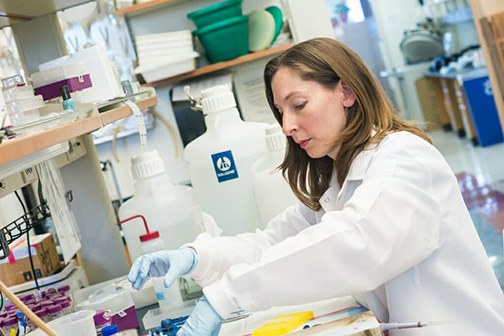Researchers find that long-time chemotherapy drug Taxol could work better for certain patients
Hospitals and oncology groups may be able to apply modern precision medicine principles to a 50-year-old cancer drug, increasing the drug’s effectiveness for breast cancer patients.
Paclitaxel (Taxol) is a well-established chemotherapy treatment, but it only works on about half of the patients who receive it. Recently discovered genome-specific effects open the opportunity to use paclitaxel for patient-specific treatments, University of Wisconsin (UW) researchers say.
Probing the Variable Outcomes Associated With Taxol
Taxol was first isolated in 1971 and is used as a chemotherapy to treat a variety of different cancers. While Taxol has saved the lives of many patients, it only benefits about half of the breast cancer patients who use it. The drug’s patterns of effectiveness are also unknown. As with many chemotherapy treatments, Taxol brings potential side effects as well.
While the benefits of Taxol have remained largely unpredictable for decades, research from the UW has revealed a potential answer for why this drug only helps certain patients. Led by associate professor Beth Weaver, PhD, a member of the UW Carbone Cancer Center, the researchers explored potential causes for the variable outcomes with Taxol treatment.
“It’s a huge problem,” said Weaver in a news release. “Nearly half of patients who get this drug can be subjected to some pretty substantial side effects without any therapeutic benefit.”

For decades, clinicians assumed Taxol worked by preventing cancer cells from dividing. However, the research concluded that Taxol instead amplified chromosomal instability, which refers to abnormal chromosome distribution among cells—a hallmark of cancer.
One Benefit of Wisconsin Taxol Research Finding
A related article titled “Chromosomal Instability Sensitizes Patient Breast Tumors to Multipolar Divisions Induced by Paclitaxel,” and published in the interdisciplinary medical journal Science Translational Medicine, explains that patients with high rates of chromosomal instability proved to be more receptive to Taxol, and for them, the drug potentially offers better tumor suppression.
“That suggested to us that the way we thought Taxol worked for the last 30 years was wrong, and that was a big question mark and concern,” Weaver explained. “Tumors that are chomosomally unstable to begin with—which we happen to know are about half of all breast tumors—are the tumors that should be sensitive to Taxol.”
One benefit of this finding is that testing for this variation of breast cancer cells can be easily applied into existing clinical practice. “You could measure for chromosomal instability on leftover tissue from a diagnostic biopsy, which patients need to have anyway, and potentially use that tissue for a biomarker test,” Weaver said.
The University of Wisconsin’s research is the first study into the relationship between Taxol and chromosomal instability. Further research is needed to validate these findings. This discovery does, however, bring significant implications for the use of Taxol in the future.
Expect More Precision Medicine Investigation of Conventional Chemotherapy Drugs
“What we’re really trying to do is turn this conventional chemotherapy into personalized medicine,” Weaver said. “That would be the best of all worlds because paclitaxel is widely used, it’s inexpensive, and clinicians have a ton of experience with it. If we could just target it to the right patients, it would be a huge improvement in cancer care.”
In addition to focusing the use of Taxol on patients who truly need it, this discovery also “opens the door to first identifying novel drug targets and then developing drugs that will sensitize to paclitaxel,” Weaver added. Doing so could enable the development of drugs that makes Taxol effective in the half of cancer patients who do not benefit from Taxol.
While the medical community and patients may see advantages from better targeting Taxol, University of Wisconsin’s research also brings wider implications. This and other precision medicine research likely will bring new approaches for other existing cancer treatments as well.
—Caleb Williams
Related Information:
How Taxol/Paclitaxel Kills Cancer Cells
Breast Cancer Researchers Learn How to Teach an Old Drug New Tricks to Help Patients
